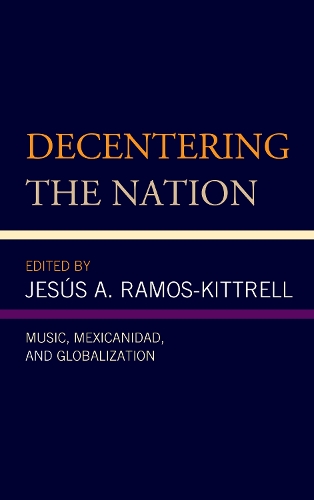
Decentering the Nation: Music, Mexicanidad, and Globalization
(Hardback)
Publishing Details
Decentering the Nation: Music, Mexicanidad, and Globalization
By (Author) Jess A. Ramos-Kittrell
Contributions by Lizette A. Alegre Gonzlez
Contributions by Ana R. Alonso-Minutti
Contributions by Csar Jess Burgos Dvila
Contributions by Alex E. Chvez
Contributions by Peter J. Garca
Contributions by Laura G. Gutirrez
Contributions by Nadine Hubbs
Contributions by Alejandro L. Madrid
Contributions by Cathy Ragland
Bloomsbury Publishing PLC
Lexington Books
12th December 2019
United States
Classifications
Professional and Scholarly
Non Fiction
History of the Americas
Media studies
306.0972
Physical Properties
Hardback
280
Width 161mm, Height 229mm, Spine 24mm
621g
Description
winner of the 2021 Ellen Koskoff Edited Volume Prize
Decentering the Nation: Music, Mexicanidad, and Globalization considers how neoliberal capitalism has upset the symbolic economy of "Mexican" cultural discourse, and how this phenomenon touches on a broader crisis of representation affecting the nation-state in globalization. This book argues that, while mexicanidad emerged in the early twentieth century as a cultural trope about national origins, culture, and history, it was, nonetheless a trope steeped in 'otherization' and used by nation-states (Mexico and the United States) to legitimize narratives of cultural and socioeconomic development stemming out of nationalist political projects that are now under strain. Using music as a phenomenological platform of inquiry, contributors to this book focus on a critique of mexicanidad in terms of the cultural processes through which people contest ideas about race, gender, and sexuality; reframe ideas of memory, history, and belonging; and negotiate the experiences of dislocation that affect them. The volume urges readers to find points of resonance in its chapters, and thus, interrogate the asymmetrical ways in which power traverses their own historical experience. In light of the crisis in representation that currently affects the nation-state as a political unit in globalization, such resonance is critical to make culture an arena of social collusion, where alliances can restore the fiber of civil society and contest the pressures that have made disenfranchisement one of the most alarming features characterizing the complex relationships between the state and the neoliberal corporate system that seeks to regulate it. Scholars of history, international relations, cultural anthropology, Latin American studies, queer and gender studies, music, and cultural studies will find this book particularly useful.
Reviews
This unique collective work explores the dialectic between national self-assertion and its subversion, through a remarkable range of situated musical practices. Its authors are committed both to ethnographic and theoretical engagement, even as they invite readers to familiarize themselves with the rich and varied soundscapes that are reshaping the very idea of "Mexican identity" today.
--Claudio Lomnitz, Columbia UniversityAuthor Bio
Jess A. Ramos-Kittrell is assistant professor in residence of ethnomusicology and music history at the University of Connecticut.
